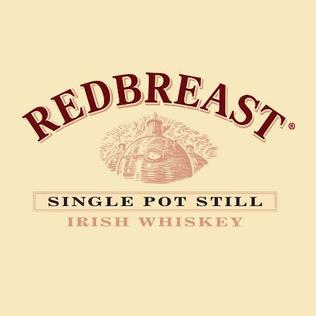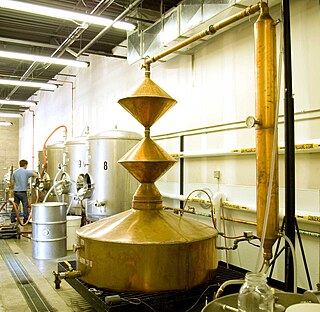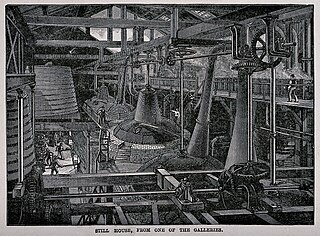Related Research Articles

Scotch whisky is malt whisky or grain whisky, made in Scotland.

Whisky or whiskey is a type of liquor made from fermented grain mash. Various grains are used for different varieties, including barley, corn, rye, and wheat. Whisky is typically aged in wooden casks, which are typically made of charred white oak. Uncharred white oak casks previously used for the aging of port, rum or sherry are also sometimes used.

Bourbon is a type of barrel-aged American whiskey made primarily from corn (maize). The name derives from the French Bourbon dynasty, although the precise source of inspiration is uncertain; contenders include Bourbon County in Kentucky and Bourbon Street in New Orleans, both of which are named after the dynasty. The name bourbon was not applied until the 1850s, and the Kentucky etymology was not advanced until the 1870s.

Single malt Scotch refers to single malt whisky made in Scotland. To qualify for this category, a whisky must have been distilled at a single distillery using a pot still distillation process and made from a mash of malted barley. Therefore, a single malt means that the whisky has not been blended elsewhere with whisky from other distilleries. As with any Scotch whisky, a single malt Scotch must be distilled in Scotland and matured in oak casks in Scotland for at least three years, although most single malts are matured longer.

Single malt whisky is malt whisky from a single distillery.
A blended whiskey is the product of blending different types of whiskeys and sometimes also neutral spirits, colorings, and flavorings. It is generally the product of mixing one or more higher-quality straight or single malt whiskey with less expensive spirits and other ingredients. This typically allows for a lower priced finished product, although expensive "premium" varieties also exist.

Rye whiskey can refer to two different, but related, types of whiskey:

Grain whisky normally refers to any whisky made, at least in part, from grains other than malted barley. Frequently used grains include maize, wheat, and rye. Grain whiskies usually contain some malted barley to provide enzymes needed for mashing and are required to include it if they are produced in Ireland or Scotland. Whisky made only from malted barley is generally called "malt whisky" rather than grain whisky. Most American and Canadian whiskies are grain whiskies.

Springbank distillery is a family-owned single malt whisky distillery on the Kintyre Peninsula in western Scotland. It is owned by J & A Mitchell & Company, which also owns the Glengyle distillery, the oldest independent bottler, William Cadenheads, and several blended scotch labels. Licensed in 1828, Springbank is one of the last surviving producers of single malt whiskies in Campbeltown, an area that once had over thirty active distilleries. The distillery produces three types of peated and unpeated malt whisky that it bottles under three distinct brands. The majority of its distillate is bottled as a single malt, with a small percentage sold to larger blenders or ending up in one of J&A Mitchell's own blended scotch labels, such as Campbeltown Loch.

A blended malt, formerly called a vatted malt, or pure malt, is a blend of different single malt whiskies from different distilleries. These terms are most commonly used in reference to Scotch whisky, or whisky in that style, such as Japanese whisky.

American whiskey is whiskey produced in the United States. American whiskeys made from mashes with at least 51% of their named grains include bourbon whiskey, rye whiskey, rye malt whiskey, malt whiskey, wheat whiskey, Tennessee whiskey, and corn whiskey.

Established in 1857, J.P. Wiser's Whisky is one of Canada's oldest continuously produced Canadian whiskeys. Hiram Walker & Sons Limited currently produces it at their Windsor, Ontario, distillery. Since 1935, J.P. Wiser's has been the majority shareholder of Corby Spirit and Wine. Both companies came under ownership of international liquor company Pernod Ricard in 2005.

Korn, also known as Kornbrand or Kornbranntwein, is a German colorless distilled beverage produced from fermented cereal grain seed. The production of Korn uses only five grains: most of the production is based on rye or wheat; barley is mainly used to obtain the required malt for the brewing process; oats and buckwheat are rarely used. The addition of food colorings, flavorings, or sweeteners is not permitted. Korn is distilled to lower alcoholic proofs and less rigorously filtered than vodka, which leaves more of the cereal grain flavor in the finished spirit.

Redbreast is a brand of single pot still Irish Whiskey produced by Irish Distillers. It was originally bottled by Gilbey's, a Dublin spirits merchant using distillate sourced from Jameson's Bow Street Distillery. In the 1980s, the brand was purchased by Irish Distillers, the producer of Jameson. It is the largest selling single pot still Irish whiskey in the world.

Downslope Distilling is a craft beverage distillery in Centennial, Colorado, United States.
Straight whiskey, as defined in United States law, is whiskey that is distilled from a fermented cereal grain mash to a concentration not exceeding 80% alcohol by volume (abv) and aged in new charred oak barrels for at least two years at a concentration not exceeding 62.5% at the start of the aging process. Domestic sales of straight whiskey surpassed 27 million 9-liter cases in 2021.

Single pot still whiskey is a style of Irish whiskey made by a single distillery from a mixed mash of malted and unmalted barley distilled in a pot still. Somewhat similar to single malt whiskey, the style was defined by its inclusion of unmalted raw barley in the mash in addition to malt. However, small amounts of raw oats or wheat may have been used at times. This unmalted component is said to give the pot still whiskey a "spicier bristle" and "thicker texture" than the otherwise similar malt whiskeys. If the whiskey is not distilled completely on the site of a single distillery, then it may be termed pot still whiskey but not single pot still whiskey.

Amrut is a brand of Indian single malt whisky, manufactured by Amrut Distilleries. It is the first single malt whisky to be made in India. Amrut (अमृत) or amrit is a Sanskrit word which can be translated as "nectar of the gods", "nectar of life", or "drink of the gods". The company translates it as "Elixir of Life". The brand became famous after whisky connoisseur Jim Murray gave it a rating of 82 out of 100 in 2005 and 2010. In 2010 Murray named Amrut Fusion single malt whisky as the third best in the world. John Hansell, editor of American magazine Whisky Advocate, wrote that "India's Amrut distillery changed the way many think of Indian whisky – that it was, in the past, just cheap Scotch whisky blended with who knows what and sold as Indian whisky. Amrut is making whisky, and it's very good".

Paul John Whisky is a brand of Indian single malt and single cask whisky, manufactured by John Distilleries. The brand launched in London, England on 4 October 2012. Paul John Whisky is made from Indian 6-row malted barley and, for some variants, imported Islay and Aberdeen peat, distilled in traditional copper pot stills and then matured in charred American Oak casks at the company's distillery in Goa, India.

The following outline is provided as an overview of and topical guide to whisky:
References
- ↑ The Scotch Whisky Regulations 2009, The National Archives, 2009.
- ↑ The Scotch Whisky Regulations 2009: Guidance for Producers and Bottlers Archived 2010-07-05 at the Wayback Machine , Scotch Whisky Association, February 12, 2009.
- ↑ "Technical file setting out the specifications with which Irish Whiskey / Uisce Beatha Eireannach / Irish Whisky must comply" (PDF). www.agriculture.gov.ie. Department of Agriculture, Forestry and the Marine. October 2014. Retrieved 28 December 2016.
- ↑ "Standards of Identity for Distilled Spirits, Title 27 Code of Federal Regulations, Pt. 5.22" (PDF). Retrieved 2008-10-17.
- 1 2 "Canadian Food and Drug Regulations (C.R.C., c. 870) – Malt Whisky (B.02.013)". (Access date March 25, 2015.)